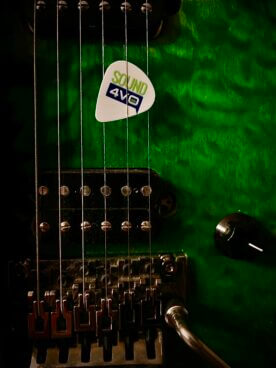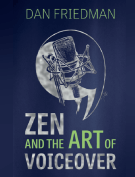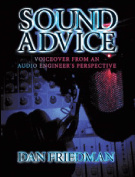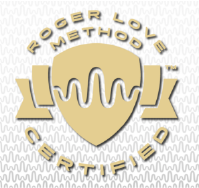 I like to share with my voice students that I am also in the process of learning. I have been learning to play guitar for almost the last two years. The guitar is a difficult instrument. It requires the development of many skills including physical dexterity, ear training, developing rhythm or timing and understanding melody. These are concepts that I understood as an audio engineer but never put into practice as a musician.
I like to share with my voice students that I am also in the process of learning. I have been learning to play guitar for almost the last two years. The guitar is a difficult instrument. It requires the development of many skills including physical dexterity, ear training, developing rhythm or timing and understanding melody. These are concepts that I understood as an audio engineer but never put into practice as a musician.
Learning guitar has been challenging, frustrating and … worth it. I didn’t think so when I was 12 years old. I wasn’t up for the frustration or the challenge. I thought, I’d pickup a guitar and become the next Eddie Van Halen … without putting in any work. Needless to say, back then I put down the guitar and almost never picked one up again.
I’ve recognized a few instances lately that parallel the thoughts and fears many of you learning voiceover frequently experience and thought I’d share my experiences as a student of guitar, with those of you who are students of voiceover. First, when I didn’t instantly become Eddie Van Halen, I began to tell myself that I would never be able to play guitar. I talked myself out of it and convinced myself it was something that I would just never be able to do. These thoughts prevented me from even trying for roughly the next 35 years. That was ridiculous.
I began by learning with online courses. I used three different apps to get started. They were all great starting points and I refer back to a couple of them often. But, nothing has kept me more focused or provided better insight than real life coaching/teaching. My guitar teacher can easily evaluate where I am in my ability and pinpoint which skills I should be focused on, so I may advance and get better more quickly. Training in guitar, in voiceover and anything you have a strong desire to be good at, is essential.
While learning from those who came before you is necessary, comparison is a killer and not helpful. The other day, I was watching a documentary with Jimmy Page. Jimmy Page of Led Zeppelin has been recognized as one of the greatest and most influential guitar players of all time. As I watch him play, I recognize the simplicity. The simplicity that comes with experience, commitment and love. The guitar is so much a part of Jimmy Page, he plays it as though it is a part of him. I felt this wave of frustration and sadness as I watched. My inner voice started to tell myself how much time I had wasted not trying, how I will never be that good or even close. Needless to say, this is not helpful. In that moment, I was comparing myself … to JIMMY PAGE! Jimmy Page hasn’t been playing guitar for only two years. He’s been playing close to 60 or more. He isn’t one of my peers. Even if he were, his experience and relationship with the guitar still wouldn’t be my experience.
In guitar you look to those who came before you for inspiration. You literally have to learn their riffs and licks so you can incorporate what they’ve done, into what you do (or hope to do.) In voiceover, many of you starting out are comparing yourselves to people like Mel Blanc, Don Lafontaine or Seth McFarlane. These are unrealistic comparisons. Even if you are comparing yourself to someone you’ve just heard on the radio or television, there is a very good chance that person is a minimum of two or more years ahead of you in their voiceover journey. Look to those who have done what you would like to do for inspiration, not comparison.
I’ve been saying this so much lately, “artistic pursuits must be experienced in order to be learned.” Two years of education is arguably the standard before most people reach a level of competency in almost any field. As a guitar player, I am just beginning to feel a level of competency to where I am now ready to play with other people. This presents its own challenges as there aren’t too many other over 50, beginning guitarists, drummers or bass players out there. Even tougher yet, because of my background, I know what sounds good. I am really only interested in playing with people far beyond my competency level. However, they understandably may not be so patient with me. Which is another reason a teacher, coach or mentor is vital.
As a voice actor, you want to be looking to your peers and your heroes. Look to your peers, not to compare your skills, but to compare the sounds of your studios and sound quality. These comparisons reveal sound differences that can be factors in whether you get the gig or not. Any sound issues revealed that need improvement, are often more quickly and easily dealt with compared to issues with performance. Look to your heroes, not to compare skills, but to be inspired. Learn from them and remember that they make it look or sound easy because they have been doing it for years.
I am committed to learning to play guitar. I play nearly every day for at least 20 minutes and some days … for hours. I have discovered so much about myself in the process. I am proud of myself for doing it! While I have regrets about not starting sooner, I have accepted what I believe to be the reasons why it has taken me this long. As I improve, I gain more confidence. At 51 years old, I am mature enough to appreciate the learning process and recognize the little victories that come along with it. I accept that I will never be Eddie or Jimmy. I can only be the best guitar player I can be at any given time. But, as long as I keep at it, I will always get better.
Voiceover as a career requires a similar commitment to patience, practice and persistence. It requires time and (like guitar) the necessity to develop many skills. If you fully commit and dedicate yourself to learning and doing all aspects of what it takes to succeed, you will likely have success. Be proud of your progress. Enjoy the learning process. Be inspired by those who came before you. Don’t compare your journey to the journey of others. Always accept that you can only be the best you … that you can be.



